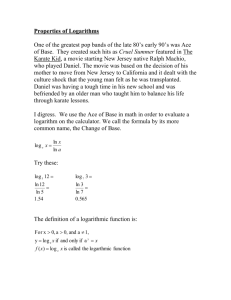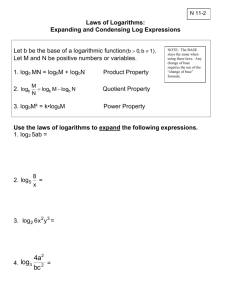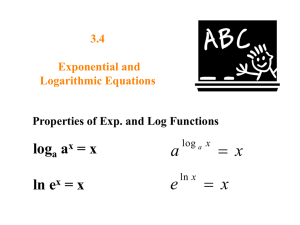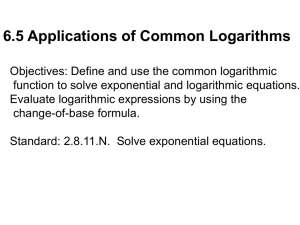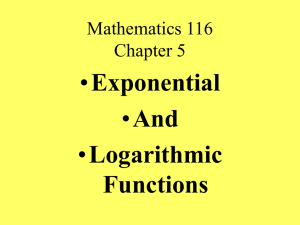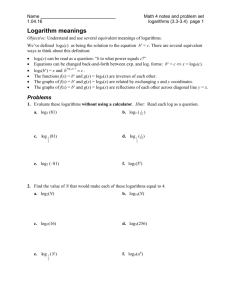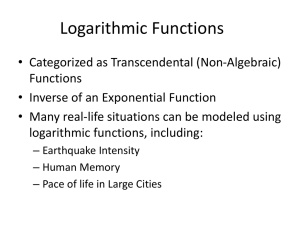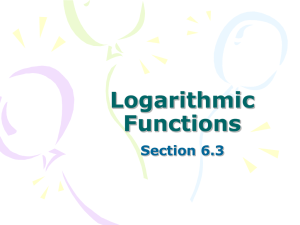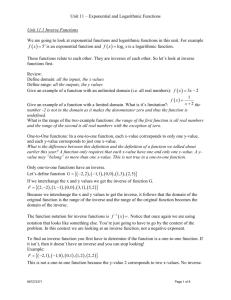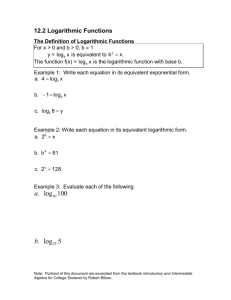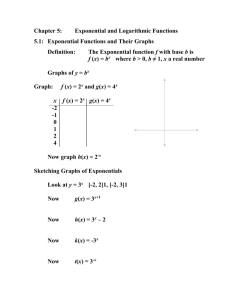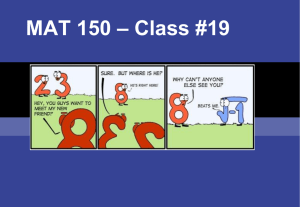Intermediate Algebra Chapter 10
advertisement
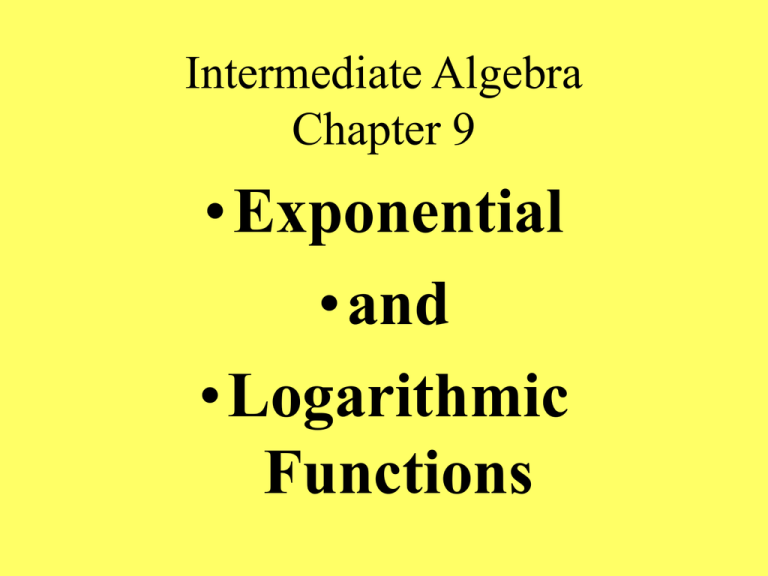
Intermediate Algebra
Chapter 9
• Exponential
•and
• Logarithmic
Functions
Intermediate Algebra 9.1-9.2
• Review of Functions
Def: Relation
• A relation is a set of ordered pairs.
• Designated by:
•
•
•
•
•
•
Listing
Graphs
Tables
Algebraic equation
Picture
Sentence
Def: Function
• A function is a set of ordered pairs
in which no two different ordered
pairs have the same first
component.
• Vertical line test – used to
determine whether a graph
represents a function.
Defs: domain and range
• Domain: The set of first
components of a relation.
• Range: The set of second
components of a relation
Examples of Relations:
1, 2 , 3, 4 5, 6
1,2 , 3,2 , 5,2
1,2 , 1,4 , 1,6
Objectives
• Determine the domain, range of
relations.
• Determine if relation is a
function.
Intermediate Algebra 9.2
•Inverse Functions
Inverse of a function
• The inverse of a function is determined by
interchanging the domain and the range of
the original function.
• The inverse of a function
is not necessarily
f
a function.
1
• Designated by
• and read f inverse
1
f
One-to-One function
• Def: A function is a one-to-one
function if no two different
ordered pairs have the same
second coordinate.
Horizontal Line Test
• A function is a one-to-one
function if and only if no
horizontal line intersects the
graph of the function at more
than one point.
Inverse of a function
f 1,2 , 3,4 , 5,6
f
1
2,1 4,3 , 6,5
Inverse of function
f 1,2 , 3,2 , 5,2
f
1
2,1 , 2,3 , 2,5
Objectives:
• Determine the inverse of a function whose
ordered pairs are listed.
• Determine if a function is one to one.
Intermediate Algebra 9.3
•Exponential Functions
Michael Crichton – The Andromeda Strain
(1971)
• The mathematics of uncontrolled
growth are frightening. A single cell of
the bacterium E. coli would, under
ideal circumstances, divide every
twenty minutes. It this way it can be
shown that in a single day, one cell of
E. coli could produce a super-colony
equal in size and weight to the entire
planet Earth.”
x
log b x log b y
y
xy log b x log b y
Definition of Exponential
Function
• If b>0 and b not equal to 1 and x is any real
number, an exponential function is written
as
x
1
1 e
x
f ( x) b
x
Graphs-Determine domain,
range, function, 1-1, x intercepts,
y intercepts, asymptotes
f ( x) 2
x
Graphs-Determine domain,
range, function, 1-1, x intercepts,
y intercepts, asymptotes
1
g ( x)
2
x
Growth and Decay
f ( x) b
• Growth: if b > 1
• Decay: if 0 < b < 1
x
Properties of graphs of
exponential functions
•
•
•
•
•
Function and 1 to 1
y intercept is (0,1) and no x intercept(s)
Domain is all real numbers
Range is {y|y>0}
Graph approaches but does not touch x
axis – x axis is asymptote
• Growth or decay determined by base
Natural Base e
x
1
as x 1 e
x
e 2.718281828
Calculator Keys
• Second function of divide
• Second function of LN (left
side)
e
x
Property of equivalent exponents
• For b>0 and b not equal to 1
if
b b
x
y
then x y
Compound Interest
• A= amount P = Principal t = time
• r = rate per year
• n = number of times compounded
r
A P 1
n
nt
Compound interest problem
• Find the accumulated amount in an account
if $5,000 is deposited at 6% compounded
quarterly for 10 years.
.06
A 5000 1
4
4 10
A $9070.09
Objectives:
• Determine and graph
exponential functions.
• Use the natural base e
• Use the compound interest
formula.
Dwight Eisenhower – American
President
•“Pessimism never
won any battle.”
Intermediate Algebra 9.4,9.5,9.6
•Logarithmic Functions
Definition: Logarithmic Function
• For x > 0, b > 0 and b not equal to 1 toe
logarithm of x with base b is defined by the
following:
logb x y x b
y
Properties of Logarithmic Function
•
•
•
•
•
Domain:{x|x>0}
Range: all real numbers
x intercept: (1,0)
No y intercept
Approaches y axis as vertical
asymptote
• Base determines shape.
Shape of logarithmic graphs
• For b > 1, the graph rises from
left to right.
• For 0 < b < 1, the graphs falls
from left to right.
Common Logarithmic Function
The logarithmic function with
base 10
log10 x y log x y
Natural logarithmic function
The logarithmic function with a
base of e
log e x y ln x y
Calculator Keys
•[LOG]
•[LN]
Objective:
• Determine the common
log or natural log of any
number in the domain of
the logarithmic function.
Change of Base Formula
• For x > 0 for any positive bases a and b
log a x
logb x
log a b
Problem: change of base
log 3 5
log10 5 log5
log10 3 log3
log e 5 ln 5 1.46
log e 3 ln 3
Objective
• Use the change of base
formula to determine an
approximation to the
logarithm of a number when
the base is not 10 or e.
Intermediate Algebra 10.5
•Properties
•of
• Logarithms
Basic Properties of logarithms
log b 1 0
log b b 1
log b x log b y x y
For x>0, y>0, b>0 and b not 1
Product rule of Logarithms
logb xy logb x logb y
For x>0, y>0, b>0 and b not 1
Quotient rule for Logarithms
x
log b log b x log b y
y
For x>0, y>0, b>0 and b not 1
Power rule for Logarithms
logb x r logb x
r
Objectives:
• Apply the product, quotient,
and power properties of
logarithms.
• Combine and Expand
logarithmic expressions
Theorems summary Logarithms:
I .logb xy logb x logb y
x
II .log b log b x log b y
y
III .logb x r logb x
r
Norman Vincent Peale
• “Believe it is possible to
solve your problem.
Tremendous things happen to
the believer. So believe the
answer will come. It will.”
Intermediate Algebra 9.7
• Exponential
•and
• Logarithmic
•Equations
Objective:
• Solve equations that have
variables as exponents.
Exponential equation
2 x1
25
15
x 0.0794
Objective:
• Solve equations
containing logarithms.
Sample Problem Logarithmic equation
log3 2 x 5 2
x2
Sample Problem Logarithmic equation
log 2 5 x 1 log 2 x 1 3
x3
Sample Problem Logarithmic equation
log 2 x 2 log 2 x 3
x 4 or x 2
2
Sample Problem Logarithmic equation
log5 x log5 x 3 log5 4
1
Walt Disney
• “Disneyland will never be
completed. It will
continue to grow as long
as there is imagination
left in the world.”
Galileo Galilei (1564-1642)
• “The universe…is
written in the language
of mathematics…”
